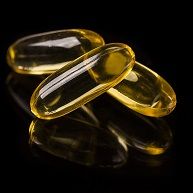Study: Vitamin D May Reduce Stroke Damage
It's too soon to say whether Vitamin D is a player or just a bystander in the assault on the brain during a stroke, but low levels of the supplement are associated with greater tissue damage in stroke patients, a University of Massachusetts Medical School team found. Reporting at the American Heart Association/American Stroke Association International Stroke Conference in Nashville, Tenn., Nils Henninger, MD said low vitamin D level predicts more severe strokes and poorer health afterwards.

It’s too soon to say whether Vitamin D is a player or just a bystander in the assault on the brain during a stroke, but low levels of the supplement are associated with greater tissue damage in stroke patients, a University of Massachusetts Medical School team found.
Reporting at the American Heart Association/American Stroke Association International Stroke Conference in Nashville, Tenn., Nils Henninger, MD said low vitamin D level predicts more severe strokes and poorer health afterwards.
“Besides its established role in bone health, vitamin D may be important to maintain brain health,” he said.
Previous studies have found low levels of vitamin D are associated with damage to the blood vessels supplying the brain.
Henninger and colleagues studied whether low blood levels of 25-hydroxyvitamin D, a marker of vitamin D status, is predictive of ischemic stroke severity and poor health after stroke. They looked at 96 stroke patients, average age 73, who were treated between January 2013 and January 2014 at a US hospital.
A low level of vitamin D was defined as lower than 30ng/mL. Stroke patients with that level showed about twice as much dead brain tissue after their stroke than patients with normal vitamin D levels.
The difference was seen both in patients with lacunar strokes and non-lacunar strokes. For each 10 ng/mL reduction in vitamin D level, the chance for healthy recovery in the 90 days following the stroke decreased by almost half, he reported. Still, the findings are not enough to make a recommendation that people up their vitamin D intact to keep their brains healthy, he said, discussing the findings at a presentation today.
“We don’t know if vitamin D is a culprit or a bystander,” he said. There were also problems with the study in that the researchers relied on reports from others for patients’ Vitamin D levels, and that they could not rule out lifestyle factors that could be having an impact on brain health.
“I can’t say take it“ he said of the supplement, except in cases where a person had a deficiency of the vitamin, “and too much Vitamin D can be dangerous.” But since Vitamin D is known to promote vascular health it is also possible it has a direct impact on containing stroke damage.